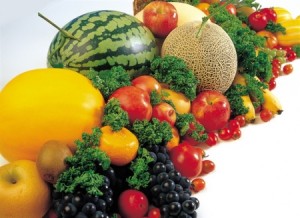Can what you eat affect asthma? Although research is far from definitive, there are some hints that this might be true. Keep in mind that individual reactions to food vary a great deal, but here are some guidelines on what to eat to possibly help asthma, or at least not make it worse.
- Foods that can help asthmatic patient:
Apples: Here’s one more reason to put apples on your list of foods to eat everyday. A British study found that even after controlling for other factors, people who reported eating two to five apples a week had a 32% lower risk of asthma than people who ate less. Any amount less than that didn’t seem to make a difference one way or the other.
Cantaloupe : Vitamin C is a potent antioxidant that may ward off lung damage by fighting free radicals. One study of preschool children in Japan found that those with the highest intake of vitamin C were less likely to suffer from asthma than those with lower intake. Although vitamin C can be found in most fruits and vegetables, they are super-abundant in citrus fruits such as orange and grapefruit, kiwi fruit, broccoli, Brussels sprouts and tomatoes.
Carrots : Carrots are famous for containing beta-carotene, another antioxidant. Preliminary studies suggest that beta-carotene, which is converted to vitamin A in the body, may reduce the incidence of exercise-induced asthma. The pigment is also essential to keep your eyes and immune system in top shape and may even help with heart disease, cancer, and Alzheimer’s disease.
Coffee: It seems that every week there’s a new headline on how caffeine might—or might not—affect your health. With regards to asthma, at least, caffeine is emerging as a good guy. One review of seven previously published trials found that caffeinated coffee might modestly improve airway function for up to four hours after it is consumed. Caffeine is a bronchodilator that may improve airflow.
Garlic :garlic has anti-inflammatory properties. Certainly centuries of folklore has put garlic at the top of the list as a remedy for any number of ailments from hemorrhoids to viral infections. But garlic does contain allicin, an exceptionally powerful antioxidant. A 2009 study revealed that as allicin decays in the body, it produces an acid that destroys free radicals.
Milk : The data are mixed as to whether milk and other dairy products can exacerbate asthma. Still, some people do have a bona fide allergy to milk, which can result in wheezing, coughing, and other respiratory symptoms. On the other hand, milk is one of the best sources of vitamin D, which may ease symptoms of asthma. Whatever the final verdict on milk and other dairy products, experts are increasingly realizing that “one of most important aspects in asthma is understanding allergies
Avocado: Avocados contain an important antioxidant called glutathione. Experts in general hail the health-promoting qualities of antioxidants far and wide. Their role in the body is to protect cells against the damage inflicted by free radicals. Avocado—be it in a salad or in guacamole—also are rich in monounsaturated fat, the kind of fat you actually want in your diet because it helps lower cholesterol.
- Foods to avoid by asthmatic paient :
Eggs: Although skin reactions such as hives are the most common manifestation of an egg allergy, asthma is another possible reaction. Egg allergies are most common in children and many outgrow them. If you or your child has such an allergy (your allergist can confirm with skin or blood tests),
Peanuts : Peanuts can provoke potentially fatal allergic reactions in some people and allergic asthma in others. But the harmful properties of this nut may go beyond that. One study found children with asthma who also had a peanut allergy seemed to develop asthma earlier than kids without a peanut allergy and were also more likely to be hospitalized and more likely to need steroids.
Salt: The data on whether salt exacerbates asthma are mixed, but an association does make sense. The hallmark feature of asthma is inflammation and tightening of the airways, and salt can contribute to inflammation by causing fluid retention.


